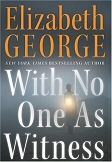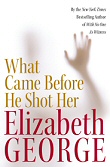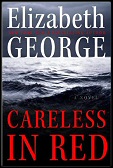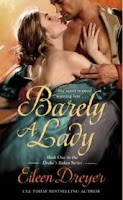Hiatus
I'm putting this blog on hiatus for a while due to health reasons. Will be back when I'm better.
I'm putting this blog on hiatus for a while due to health reasons. Will be back when I'm better.
Write back:
3
comments
Posted on:
5/17/2010 07:06:00 PM
![]()
Labels: Health
Copyright 2006–2023 Keira Soleore (keirasoleore.blogspot.com)
This embodies me on most days... courtesy of papertyger.

Write back:
2
comments
Posted on:
5/14/2010 12:35:00 AM
![]()
Labels: Humor
Copyright 2006–2023 Keira Soleore (keirasoleore.blogspot.com)
WARNING: If you haven't read This Body of Death by Elizabeth George or any of the three prior books and are planning on doing so, then please do not read this post further. SPOILERS abound!
 American Author Elizabeth George writes mysteries in the grand old tradition of British Classic Crime novels started in the Golden Age between the two world wars. That tradition has been carried into modern times by P.D. James, Ruth Rendell, Deborah Crombie, and George among others.
American Author Elizabeth George writes mysteries in the grand old tradition of British Classic Crime novels started in the Golden Age between the two world wars. That tradition has been carried into modern times by P.D. James, Ruth Rendell, Deborah Crombie, and George among others.
Mysteries are fictional novels blah blah blah. Characters are the purview of the author blah blah blah. Continuing characters can be taken in any direction that the author wishes to do so blah blah blah.
And yet... I felt devastated by George's April book This Body of Death. The reasons for this are two-fold. But first, a preamble...
I have read every one of her books. George was the reason I was introduced to the world of Brit Classic Crime—intellectual, realistic, and not unnecessarily gory or terrifying simply for the sake of jerking the reader's chain. However, George's books have gotten progressively darker. So far, I kept faith, because of the integrity and complexity of her protagonists and stories. I genuinely like(d) them.
 For many fans, the ending of With No One As Witness was a huge shock and cause for disenchantment. For me, the ending and Lynley's reactions were very much on par for the story, series, and character arcs that George had set in motion. For me, the horror was in the next book What Came Before He Shot Her, which contains children doing terrible things to other children and having terrible things done to them in turn. (As a book in a continuing character series, the fascinating part was that this next book was a prequel to the former book. Cleverly done, with a gutsy writerly approach.)
For many fans, the ending of With No One As Witness was a huge shock and cause for disenchantment. For me, the ending and Lynley's reactions were very much on par for the story, series, and character arcs that George had set in motion. For me, the horror was in the next book What Came Before He Shot Her, which contains children doing terrible things to other children and having terrible things done to them in turn. (As a book in a continuing character series, the fascinating part was that this next book was a prequel to the former book. Cleverly done, with a gutsy writerly approach.)
 Violence towards children is a deal-breaker for me. Usually. For George's sake, I was willing to assume that the stuff in What Came Before He Shot Her was a one-off. However, two books later, in This Body of Death, juvenile voilence is back and the atrocity is far more gruesome. Involves a small child, too.
Violence towards children is a deal-breaker for me. Usually. For George's sake, I was willing to assume that the stuff in What Came Before He Shot Her was a one-off. However, two books later, in This Body of Death, juvenile voilence is back and the atrocity is far more gruesome. Involves a small child, too.
Detective Inspector Lynley of the Scotland Yard is a peer of the realm, a belted earl complete with a butler, wealth, fabulous education, and a great big pile in Cornwall. And yet, he feels compelled to work as a policeman. In Lynley, George has also created a roué who goes through the Metropolitan Police department females chapter and verse. This isn't conjecture on my part, but related through the eyes of his Detective Sergeant Barbara Havers. Thank the gods that he hasn't banged Havers yet. Lynley has no moral, ethical, or even health reasons for abstaining—the only reason being that he so out-classes her. Modern Brtish society is still rife with class distinctions. A nobleman cannot conceive of playing tickle-n-poke with a person of the lower middle classes. In This Body of Death, Lynley's monologue shows that he's aware of Havers's interest in him, but his involvement with her is "laughable."
 Now in Careless in Red, Lynley is suffering through intense grief following a traumatic event. He takes off on a solitary walking journey of the west coast that's equal parts endurance and healing, following days of a drinking binge. In the course of the story, he gets involved in solving a local crime and also having it on with the principle suspect. (wry) I'm still willing to give George and Lynley leeway here, because I think this promiscuousness is another expression of grief. After all he had reformed while he was married.
Now in Careless in Red, Lynley is suffering through intense grief following a traumatic event. He takes off on a solitary walking journey of the west coast that's equal parts endurance and healing, following days of a drinking binge. In the course of the story, he gets involved in solving a local crime and also having it on with the principle suspect. (wry) I'm still willing to give George and Lynley leeway here, because I think this promiscuousness is another expression of grief. After all he had reformed while he was married.
 Then along comes This Body of Death, and Lynley is back at the Met and back at having the hots for the new department woman, his superintendent, this time. Isabelle Ardery is a poor investigator, doesn't know how to hold a team together or lead, jumps to conclusions on thinest circumstantial evidence, treats the people working for her badly, treats Lynley like her go-fer, is an alchoholic...but never mind, Lynley is still interested. I'm still reading, mind, because perhaps George in her great talent might redress matters here. Nope. Lynley catches her in her apartment passed out drunk, sticks her in the shower with her clothes on to revive her, makes her coffee and toast to sober her up, and then sleeps with her. And then proceeds to tell Assistant Commissioner David Hillier that he should keep her on, because this case wasn't a fair test of her skills.
Then along comes This Body of Death, and Lynley is back at the Met and back at having the hots for the new department woman, his superintendent, this time. Isabelle Ardery is a poor investigator, doesn't know how to hold a team together or lead, jumps to conclusions on thinest circumstantial evidence, treats the people working for her badly, treats Lynley like her go-fer, is an alchoholic...but never mind, Lynley is still interested. I'm still reading, mind, because perhaps George in her great talent might redress matters here. Nope. Lynley catches her in her apartment passed out drunk, sticks her in the shower with her clothes on to revive her, makes her coffee and toast to sober her up, and then sleeps with her. And then proceeds to tell Assistant Commissioner David Hillier that he should keep her on, because this case wasn't a fair test of her skills.
Arrrrrggghhhh!!!! I give up! Given what I read and what I write, I'm hardly a prosing bore about sexual morals in fictional characters. However, a modern titled rake who can't keep his pants zipped except for the brief period of his marriage with no thought for protection against STDs is completely unbelievabe to me. Does he have no discernment? No dignity, sense of self-respect? Or is that the point? Either way, I have lost interest in seeing whether Lynley will end up with Havers and/or reading the dark, seediness that pervades her books these days. And I mourn the loss.
Write back:
8
comments
Posted on:
5/13/2010 02:45:00 PM
![]()
Labels: Craft: Characters, Craft: Critique, Leisure: Reading
Copyright 2006–2023 Keira Soleore (keirasoleore.blogspot.com)
 Brilliant article by Eileen Dryer for CNN on common ignorant criticism of romance writers and on the true reasons why she writes romance. Eileen Dreyer (also writing as Kathleen Korbel) has written more than 36 books in romance and suspense. Her July 2010 release Barely a Lady will be her first foray into historical romance.
Brilliant article by Eileen Dryer for CNN on common ignorant criticism of romance writers and on the true reasons why she writes romance. Eileen Dreyer (also writing as Kathleen Korbel) has written more than 36 books in romance and suspense. Her July 2010 release Barely a Lady will be her first foray into historical romance.
 I've included the article here in its entirety, because I believe that it's very important that everyone who visits here should have the opportunity to read it. If providing a link would mean that some folks wouldn't have the time to go read it elsewhere, now they can read it right here. The copyright for every word of that entire article is held solely by Eileen Dryer and CNN.
I've included the article here in its entirety, because I believe that it's very important that everyone who visits here should have the opportunity to read it. If providing a link would mean that some folks wouldn't have the time to go read it elsewhere, now they can read it right here. The copyright for every word of that entire article is held solely by Eileen Dryer and CNN.
* * *
I write romance novels.
That obviously means that I am a sexually frustrated loser dressed in a robe and bunny slippers who lives in a dreary apartment with my cat and lives vicariously through my devastatingly beautiful heroines.
At least that's how I'm portrayed in most media.
OK, maybe I do wear bunny slippers. But that's only because my daughter bought them for me as a joke, and they keep my feet warm.
Oh, all right, I also have a couple of cats. And yes, in fact, I do have a libido. But that's as far as I go in resembling the caricature.
I actually don't write or read romances because I'm lonely, or because I feel inadequate, or want the chance to sneak a peak at dirty words. If you want to get political, I write romance because I like to remind myself (and everyone else. Writers are compelled to make other people listen to them) that I deserve everything I want in a relationship. I deserve to be happy, to be satisfied, to be safe, to be an equal. I deserve to be solvent and for my children to be taken care of.
As a genre written by women primarily for women, it is our promise to each other that life is worth reproducing. It's our commitment to the future. Pretty heavy stuff for heaving loins, huh?
If you think about it, though, we're in the business of hope. No matter what happens in a romance (and trust me, after 26 romances, I've had absolutely everything happen, from attempted suicide to the battle of Waterloo), everything comes out all right. We romance writers say, "If we just commit to each other, if we work together, we can get through anything." Very powerful message, if you ask me.
But romances are just fantasy, you protest. Of course they are. So is every Tom Clancy book, Shakespeare play, and political ad. I make no apologies for the fantasies in romance.
Yes, the heroines tend to be relentlessly orgasmic. The heroes are just as relentlessly manly (as much as I'd love to say that my heroes are everyman, not one of them has looked like Steve Buscemi) and impossibly stoic when wounded.
(Most people assume that women love an injured hero because it brings out her nurturing instincts. They expect us to go all Marion to Indiana Jones' reluctant winces. Baloney. Any woman who has had to put up with her husband's near-fatal colds knows that the fantasy of an injured hero is that he doesn't whine.)
But after 20 years of writing romances and 36 years of marriage, I have to admit that there is one fantasy that is becoming more and more important to me.
I have children. I have grandchildren. My husband and I are both getting gray, and over the years we have collected responsibilities and distractions like dust bunnies.
We love each other even more than when we first married, but it's a tempered love, well-worn and familiar. It isn't new. It isn't exciting. It isn't a revelation. It isn't completely, utterly, magically all-consuming. We have to share it with kids and careers and the responsibilities of the wider world.
But when I read a romance, I can return to that moment in a blooming relationship when I could be perfectly selfish, when nothing really existed but my lover.
When love was an exhilarating surprise, and the world seemed a bit brighter, tasted sweeter, made me smile more, just because the man I loved was in my life. When we could disappear for an entire weekend, doing nothing but lying in bed naked reading (well, some of the weekend reading, anyway) and suffer no consequences (like the state wanting to know why our 12-year old is out driving our other kids to ball practice).
After all, after 36 years of marriage, it's been a long time since I've been able to indulge in one person like that. And I admit it: I miss it, too.
But sometimes, when I open a book and read about a man and a woman who are just discovering each other, I can relive it. I can remind myself that it was a wonderful part of my courtship and marriage.
And, if I'm very lucky and the stars are aligned and nothing calls us away, I can remind my husband of it, too.
Not a bad fantasy at all.
Write back:
0
comments
Posted on:
5/12/2010 09:11:00 AM
![]()
Labels: Business: Authors, Business: PublishingIndustry, Life: Committment, Life: Grace
Copyright 2006–2023 Keira Soleore (keirasoleore.blogspot.com)
 Dr. Language has provided a one-stop cure for all your spelling ills. Here are the 100 words most often misspelled ('misspell' is one of them). Each word has a mnemonic pill with it and, if you swallow it, it will help you to remember how to spell the word. Master the orthography of the words on this page and reduce the time you spend searching dictionaries by fifty percent.
Dr. Language has provided a one-stop cure for all your spelling ills. Here are the 100 words most often misspelled ('misspell' is one of them). Each word has a mnemonic pill with it and, if you swallow it, it will help you to remember how to spell the word. Master the orthography of the words on this page and reduce the time you spend searching dictionaries by fifty percent.
 Here are some examples...
Here are some examples...
accommodate — Remember, this word is large enough to accommodate both a double [c] AND a double [m].
mischievous — This mischievous word holds two traps: [i] before [e] and [o] before [u]. Four of the five vowels in English reside here.
misspell — What is more embarrassing than to misspell the name of the problem? Just remember that it is mis + spell and that will spell you the worry about spelling "spell."
Privilege — According to the pronunciation (not "pronounciation"!) of this word, that middle vowel could be anything. Remember: two [i]s + two [e]s in that order.
Restaurant — 'Ey, you! Remember, these two words when you spell "restaurant." They are in the middle of it.
vacuum — If your head is not a vacuum, remember that the silent [e] on this one married the [u] and joined him inside the word where they are living happily ever since. Well, the evidence is suggestive but not conclusive. Anyway, spell this word with two [u]s and not like "volume."
 My bêtes noirs...
My bêtes noirs...
occasionally — Writers occasionally tire of doubling so many consonants and omit one, usually one of the [l]s. Don't you ever do it.
occurrence — Remember not only the occurrence of double double consonants in this word, but that the suffix is -ence, not -ance. No reason, just the English language keeping us on our toes.
Do you have any words that tend to trip you up?
Write back:
4
comments
Posted on:
5/11/2010 12:55:00 AM
![]()
Labels: Research: Words
Copyright 2006–2023 Keira Soleore (keirasoleore.blogspot.com)
This is my gorgeous bonnet...

...to go with my gorgeous gown...

...that goes with my gorgeous reticule...
...accessorized by gloves and a gorgeous fan.
No gorgeous shoes, alas!
No gorgeous me either; woe!
I talked HERE about the marvelous Mrs. McCabe, seamstress extraordinaire, who handmade my gown using period-appropriate stitchery techniques and costume-making details. She has my life-long gratitude.
Thanks go to the fabulous milliner Laura at Austentation for the Elinor styled hat.
Thanks also go to the Regina Scott, Sir Reggie at the Beau Monde Soirées, for the fan.
An aside...
 Thanks to Kristine Hughes & Victoria Hinshaw and Jo Manning, I discovered that you can own your very own London Blue Plaque issued by the London County Council. Oh, very well, it's not the official blue plaque that'll grace the walls of a London architectural marvel. It's just an image that you can download and display.
Thanks to Kristine Hughes & Victoria Hinshaw and Jo Manning, I discovered that you can own your very own London Blue Plaque issued by the London County Council. Oh, very well, it's not the official blue plaque that'll grace the walls of a London architectural marvel. It's just an image that you can download and display.
Write back:
5
comments
Posted on:
5/10/2010 12:35:00 PM
![]()
Labels: Research: Costumes, Research: Regency
Copyright 2006–2023 Keira Soleore (keirasoleore.blogspot.com)